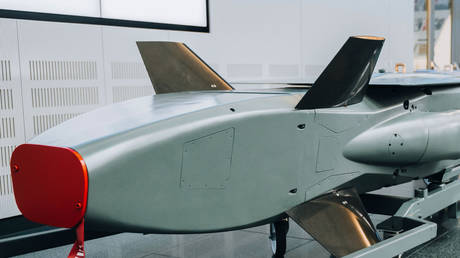ARTICLE AD BOX
The German chancellor has said Berlin would have to select Russian targets itself, were it to supply Taurus systems
German Chancellor Olaf Scholz has said that the very nature of long-range Taurus missiles, which Ukraine has been requesting for months now, precludes Berlin from supplying them. He has claimed that use of the weapons, which boast a range of 500 kilometers (310 miles), would risk triggering a direct confrontation between NATO and Russia.
While Germany has generously supplied Ukraine with military hardware, Scholz has staunchly refused to follow France and Britain in providing long-range missiles.
Russia has repeatedly warned that by giving Ukraine ever more sophisticated weaponry, the West is inching closer to becoming directly involved in the hostilities, with potentially dire consequences.
During a Q&A session in Berlin on Friday, a young Ukrainian refugee asked the chancellor why he was still unwilling to provide Kiev with Taurus missiles despite renewed Russian activity in Kharkov Region.
Scholz replied that “every single decision must be thoroughly weighed up,” adding that it is his responsibility to prevent a scenario “where it comes to an escalation of the war, to a war between Russia and NATO.”
As for Taurus missiles specifically, “it would only be tenable to deliver [this weapon] if we determine and define the targets ourselves, and that is again not possible if you don’t want to be part of this conflict,” he explained.
The German leader played up his government’s contribution to Ukraine’s defense so far, noting that Berlin had earmarked €28 billion ($30.4 billion) for military assistance, making it Kiev’s second-largest backer.
Read more Germany halts production of Taurus missiles – manufacturer
Germany halts production of Taurus missiles – manufacturer
Chancellor Scholz concluded by stating that “we have really pushed it to the limit in terms of what we can do.”
In an opinion piece published on Thursday in The Economist, Scholz wrote that “it is important to be crystal clear that NATO does not seek confrontation with Russia.” He vowed that Berlin “will not do anything that could turn us into a direct party to this conflict.”
Earlier this week, Chancellor Scholz criticized a proposal for a NATO-enforced no-fly zone over Ukraine that had been put forward by the former chief of the military bloc, Anders Fogh Rasmussen, together with the Ukrainian government.
“Again and again, there are those who say that one should do this or one should do that. I have a feeling that one does not speak better when foaming at the mouth,” Scholz said, branding the idea as dangerous.
.png)
 6 months ago
2
6 months ago
2








 English (US)
English (US)